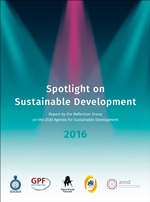Press Release: 2030 Agenda: Good or Bad Start?
Published on Mon, 2016-07-11 17:15
The 2030 Agenda has the potential to correct the errors and omissions of the MDG approach to development, writes Jens Martens, from Global Policy Forum, in the introduction to this new report: “If taken seriously it has the potential to change the prevailing development paradigm by re-emphasizing the multidimensional and interrelated nature of sustainable development and its universal applicability.” But before this can be done, a number of obstacles need to be addressed. Can the 2030 Agenda be achieved without a global approach to taxes? Can it be assessed without promoting human rights and addressing the responsibilities of the rich and powerful? Can it be reviewed without effectively addressing climate change, illicit financial flows, conflicts, and trade and investment agreements? Can it be measured with a single number? With 300 such numbers? Or do we need a new kind of dashboard to monitor sustainability? These and other questions have been tackled by a global alliance of civil society organizations and networks in their first “Spotlight Report” to be launched today, Monday July 11, 2016 at the UN headquarters in New York. The report also focuses on the fulfilment of the 17 Sustainable Development Goals, with civil society reports from around the world, focusing on the inequalities, means of implementation and systemic issues that create the main obstacles to progress. Barbara Adams, from Global Policy Forum, explained that “the 2030 Agenda is universal, not just because the SDGs are global in scope, but also because all countries have to do something to achieve them. No country can deem itself to be sustainably developed and having already done its part to meet the SDGs. The 2030 Agenda ofers the opportunity to challenge the idea that development is a phenomenon that occurs only in countries of the global South while the North is already ‘developed’.” The report identifies obstacles to achieving the SDGs and argues for policies that request the biggest eforts from those that have so far benefited the most. The “Spotlight” describes transnational spill over effects that influence or even undermine the implementation of the goals, such as tax havens and unfair trade and investment rules. Are the current policy approaches, as they are reflected, inter alia, in the 2030 Agenda, an adequate response to the challenges and obstacles (or are they part of the problem)? What has to be done? Which specific policy changes (at international level) are necessary? Speakers: Barbara Adams (Social Watch), Jens Martens (Global Policy Forum), Ziad Abdel Samad (Arab NGO Network), Chee Yoke Ling (Third World Network), and others. Organizers: Arab NGO Network for Development (ANND), Development Alternatives with Women for a New Era (DAWN), Social Watch, Third World Network, Global Policy Forum, with support of Friedrich-Ebert-Stiftung For additional information, contact: Download here the press release in pdf version. |
SUSCRIBE TO OUR NEWSLETTER



